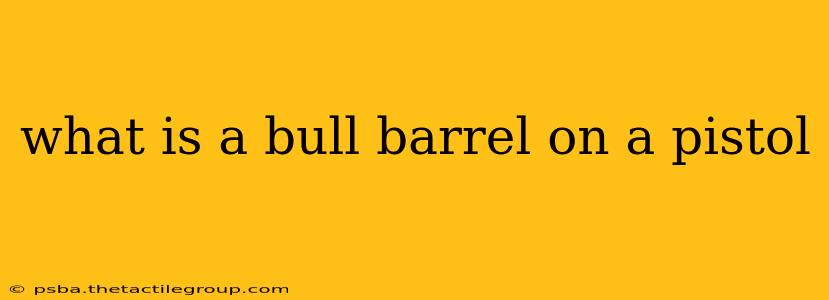A bull barrel on a pistol is more than just a visually striking feature; it's a significant upgrade designed to enhance accuracy and reduce recoil. Understanding its design, benefits, and drawbacks is crucial for any serious pistol enthusiast or competitive shooter. This guide dives deep into the world of bull barrels, explaining everything you need to know.
Understanding the Bull Barrel Design
Unlike standard pistol barrels that taper towards the muzzle, a bull barrel maintains a consistently thick diameter along its entire length. This thicker profile, often extending to the muzzle, offers several key advantages:
Increased Mass and Rigidity:
The most significant benefit of a bull barrel is its increased mass. This heavier barrel resists vibrations and flex significantly better than a thinner barrel. These vibrations, caused by the pressure of the cartridge firing, can negatively impact accuracy. By minimizing this flex, the bull barrel contributes to greater shot-to-shot consistency.
Enhanced Stability:
The added weight also contributes to increased stability during firing. This is particularly beneficial for shooters who may have a less-than-perfect grip or are firing rapidly. The heavier barrel helps mitigate muzzle rise and makes follow-up shots quicker and more accurate.
Improved Heat Dissipation (in some cases):
While not always a primary design goal, the increased surface area of a bull barrel can sometimes lead to better heat dissipation, particularly during rapid fire. This can be important for sustained accuracy in situations involving multiple shots in quick succession. However, it's crucial to note that this benefit isn't always significant enough to be a deciding factor for all users.
Bull Barrel Advantages: Why Choose One?
- Improved Accuracy: The primary reason for choosing a bull barrel is its enhanced accuracy. The reduced barrel flex and vibrations translate directly into tighter groups on the target.
- Reduced Recoil: The added weight helps absorb recoil, making the pistol easier to control, especially for higher-caliber rounds.
- Enhanced Stability: As mentioned above, the heavier barrel enhances stability, aiding in rapid-fire accuracy and follow-up shots.
- Increased Durability: The thicker barrel construction generally leads to increased durability and longevity compared to standard barrels.
Bull Barrel Disadvantages: Potential Drawbacks
- Increased Weight: The most significant drawback is the increased weight. This can make the pistol more cumbersome to carry and potentially impact concealability for some users.
- Cost: Bull barrels are often more expensive to manufacture than standard barrels, reflecting in a higher price point for the pistol or as a standalone replacement part.
- Reduced Maneuverability: The added weight can slightly reduce maneuverability, making quick target acquisition slightly more challenging in close-quarters scenarios.
Bull Barrels: For Whom Are They Best Suited?
Bull barrels are a great option for:
- Competitive Shooters: The improvements in accuracy and stability are crucial for competitive shooting, where even minor improvements can make a huge difference.
- Precision Shooting Enthusiasts: Anyone seeking maximum accuracy from their pistol will find a bull barrel to be a significant upgrade.
- Those Who Value Reduced Recoil: The heavier barrel makes the pistol easier to control for those sensitive to recoil or shooting larger calibers.
However, bull barrels may not be ideal for:
- Concealed Carry: The increased weight and size can negatively impact concealability.
- Those Prioritizing Lightweight Pistols: If weight is a primary concern, a standard barrel remains a better choice.
Conclusion: Making the Right Choice
Ultimately, the decision of whether to choose a pistol with a bull barrel depends on your individual needs and priorities. Weigh the advantages of increased accuracy and stability against the drawbacks of increased weight and cost. If accuracy and control are paramount, a bull barrel is a worthwhile investment. However, if portability and light weight are prioritized, a standard barrel might be the better option. Consider your shooting style, intended use, and personal preferences before making your choice.

